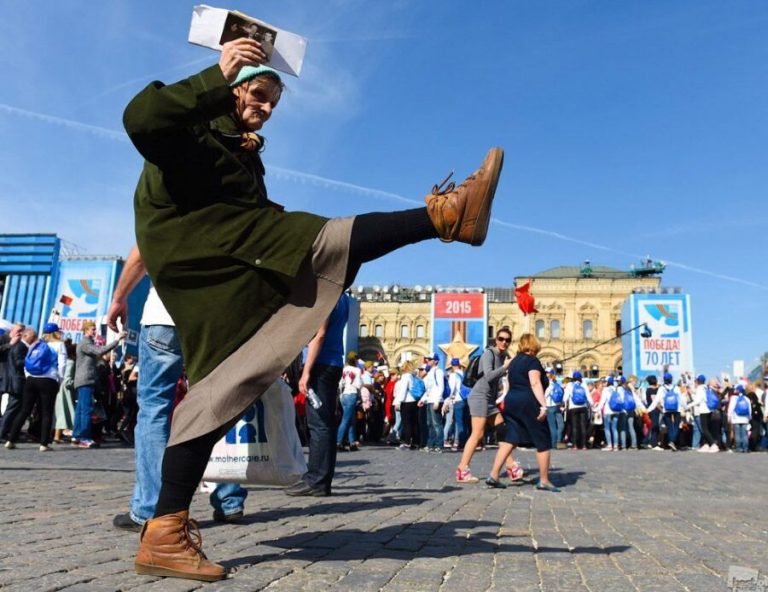Russia tends to use World War II theme in the framework of system information operations against the West. The narratives aim to falsify history and distort facts in order to dominate globally in the modern political goals.
May, 7 US Secretary of State Mike Pompeo and nine Central and Eastern European foreign ministers condemned Russia for its bid to falsify the history. The statement ahead of the 75th anniversary of the end of World War II was released by Bulgaria, the Czech Republic, Estonia, Hungary, Latvia, Lithuania, Poland, Romania, Slovakia, and the United States. 73 deputies of the Estonian parliament (Riigikogu) representing all five parliamentary factions also signed a political statement condemning Russia for trying to manipulate the history of World War II.
The historical revision aims to reconsider the role of the current geopolitical opponents of the Kremlin in the war and their accusations of supporting Nazism. For example, Vladimir Putin and other senior Russian officials have recently accused Poland of bearing some responsibility for the outbreak of the war.
At the same time, Moscow traditionally hushed up the joint operation with the Nazi forces against the Polish army conducted on September 17, 1939. Russia downplays the fact of a joint Nazi-Soviet parade in Poland after its occupation.
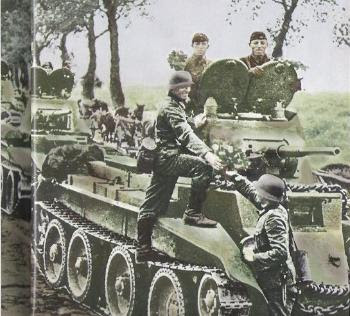
The grateful soldiers of the Nazi Wehrmacht hand flowers to their Soviet allies, Poland, 1939. 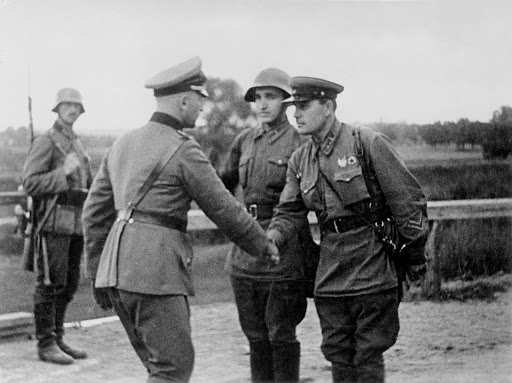
Soviet soldiers celebrating the invasion of Poland with their Nazi allies. 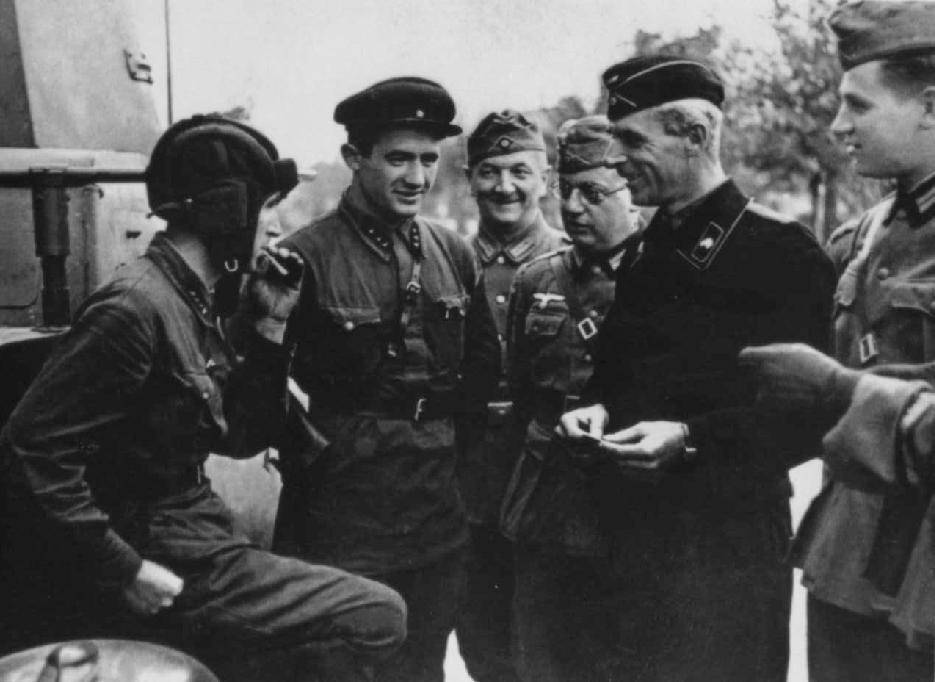
In the 1920s and early 1930s, a German military aviation school deployed on the territory of the USSR (near the city of Lipetsk); this was a place where new types of German combat aircraft and weapons were tested. Thus, the Soviet Union helped Germany in the development of military aviation by ignoring the terms of the Treaty of Versailles.
Russia uses history and mythologem formation issues as an instrument to pursue current political goals. The instrument that allows it to form the image of a superpower and, simultaneously, by positioning its actions to the citizens of the Russian Federation as the way to protect them. Armed aggression, violation of international law and the permanent search for the enemy against the background of distortion of historical discourse, is the foundation of the relationship between the Russian government (state) and the population.
The weakness of Russia’s modern institutions and the lack of a national idea lead to the exploitation of narratives of the Soviet Union. Thus, Russia insists on the continuity of the Soviet state and takes all its credit. Russia’s recognition of contribution of other states and former Soviet republics to the victory in World War II would mean the loss of its exceptionalism. This is the difference between Soviet politics emphasizing the cumulative effect of all peoples of the USSR, and politics of modern Russia focusing on its leadership and exclusivity, as well as its messianism for other peoples of the former Soviet republics. In fact, it means that after the fall of the USSR, in its relations with the former Soviet republics Russia behaves as a colonist and builds its foreign policy with them mainly on military, financial and resource leadership.
The Russian people see May 9 as the only opportunity to cultivate their invincibility over the enemy. People need something to be proud of. Since the modern state does not give Russians any boast, they are offered historical pride. At the same time, for the whole period of the Soviet era victory in World War II is the only source of pride associated with something valuable and socially important on a global scale.
However, with the less war real witnesses it is getting easier to replace the memories with fake narratives and use them in the interests of modern politics, for example, to convince the population that World War II was the result of the joint ambition of the United States and Great Britain to dominate globally.
On the one hand, Russia is trying to mythologize and give a romantic touch to the war as such. Moscow seeks to show the war as a heroic epic repressing the very idea of the war inadmissibility as a civilizational solution to the conflict.
Such heroization serves as an element of motivation for patriotic education. In Russia, children since childhood learn military attributes of World War II. Military education implies both patriotism and loyalty to the political regime, the willingness to sacrifice oneself on orders of the country’s leaders as an unconditional element of the hero’s behavior. The goal is to reorient patriotic feelings in the direction of supporting the current government under any conditions. Since the foreign enemy opposes the current government of Russia, a citizen who speaks out against the government opposes the state as a whole, and therefore he is considered as a traitor and enemy of the state.
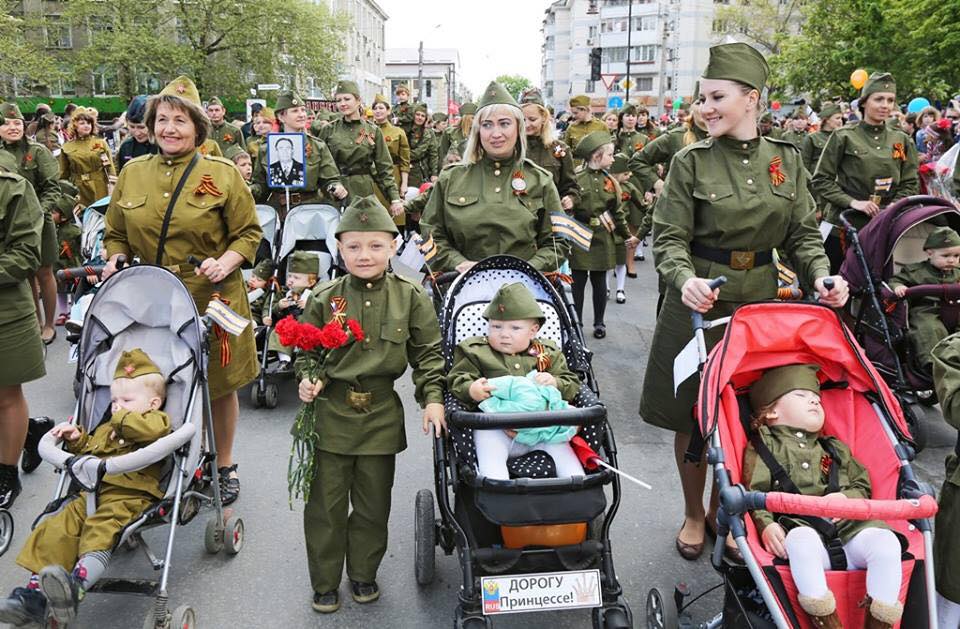
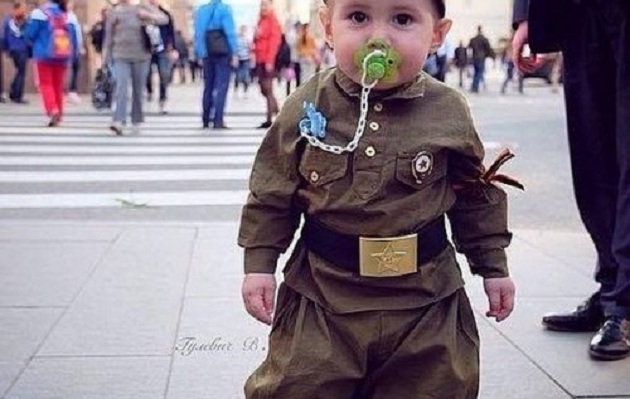

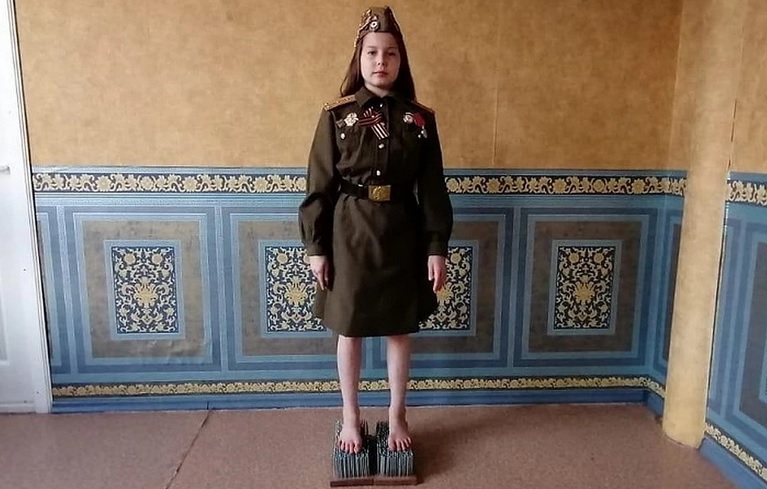
Russian girl stands on nails and sings patriotic song.
On the other hand, Moscow uses the fear of war to influence the population and puts it up against actual problems. It uses the phrase ‘there is nothing worse but war’ in order to replace disappointment and dissatisfaction with the low living standard, corruption and the arbitrariness of the government by the fear of war. The Russians try to soften any dissatisfaction with the current conditions with the thesis ‘it could be worse’.
The difference between the Western approach to commemorate the victory over Nazism in the form of paying tribute to the memory of the fallen, and the Russian approach to glorify and demonstrate militarism with the provocative message ‘we can repeat’ defines value differences and attitudes to people’s lives in the state political system.
De facto the Kremlin supports military-centricpolicy allowing shifting public focus from economic problems and failures of state social policy. By maintaining tension in the society, the threat of war, the Russian government keeps controlling the situation inside the country. As soon as the foreign threat stops dominating in the information space of Russia, the population will start paying more attention to living conditions and socio-economic issues that will lead to the collapse of the regime.
Moscow needs a war as a tool to mobilize society around a leader offering the population a social contract: a guarantee of peace inside Russia and the removal of the de facto phantom risks of foreign aggression in return for violating the civil rights and freedoms. The enemy should be more dangerous and its existence justifies the repressive policy of the government, including any opposition movement suppression.
The Kremlin is propagandizing among Russians the fear of war unleashed against them in order to justify its aggressive policy towards other countries. That is why the Russian government releases information about the military campaigns launched by Russia in a quite different way. In this case, it is positioned as an international duty. It is extremely important for Moscow that the intervention is carried out at the request of the puppet government or organizations positioned themselves as representatives of the people of a foreign state, as happened, for example, in Afghanistan or Syria. In this case, a military invasion is rendered as an aid to the ‘friendly people’, and in this context any country, not only with a Slavic population, can be intervened. Regardless of whether the ‘brothers’ are situational, or have age-old relations, political expediency being enforced with active propaganda can change the attitude of the Russian population towards this country very quickly. This is facilitated by a quite low level of education of the population, including propaganda cliches formed in the Soviet Union and sometimes even during the time of the Russian Empire, as well disastrous critical thinking that has been suppressed by the state repressive machine for hundreds of years.
The threat of external aggression and efforts to prevent it justify the Russian government’s actions. Such a threat should not come from a specific country or regime, as it can be denied. Fascism is chosen as a threat, as an ideology well-understood by millions of Russian citizens through mythologies, visual and audio products, and monumental symbolism. This threat is situationally personified in the face of any country that does not share Russia’s imperial ambitions. In this case, its leaders are accused of Fascism and the propaganda machine starts working and reinforcing the idea. By the Kremlin’s concept, the victory over fascism cannot be complete as it contradicts the task of constant public mobilization around the government as a security center and guarantee. In addition, if Fascism is defeated, one will have to look for another enemy and get ready for the explanations that the population may not accept.
Despite the fall of the Third Reich, the Kremlin conceptually keeps the threat of its rebirth without reference to any country. Regardless of Russia’s current geopolitical opponent, the threat of Fascism allows exploiting a wide range of threats: the secret police – the Gestapo, concentration camps, tortures. The more terrifying images of such a war (or the image of Russia’s enemy), the more rights and freedoms restricted by the government the citizens will agree to accept. Since the threat of Fascism needs to be impressed and applied in different countries, conspiracy theories allowing connecting things that are not connected by facts and logic are actively used.
Decreasing the number of World War II veterans opens up to the Kremlin an opportunity to revise the history. The absence of war witnesses makes it possible to change the idea of the war as much as possible, changing the meanings and facts. It was the distancing in time of these events that allowed Vladimir Putin in 2014 to violate the ban existing for a long time and defend the 1939 Molotov-Ribbentrop Pact as a treaty serving Moscow’s interests.
The speculative nature of the theme of victory in World War II for Russian leaders also lies in the Kremlin’s support for ultra-right and neo-Nazi forces in Europe. Such a policy allows televising a necessary picture to the Russian population and reinforcing the fear of the revival of Nazism with the help of propaganda.


